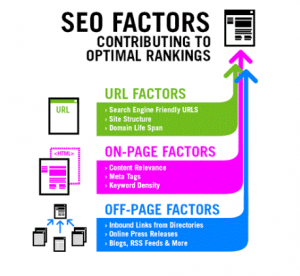
So many things have been said about the latest SEO plugging and people are going crazy buying, using and commenting on these plugging which promise ‘magical results.’ In our quest for these quick fixes, are we forgetting that the life of any website is code?
In fact, the life of the plugging themselves is code and with a few manual tweaks we can optimize our websites and posts without the cost.
I’m going to share some tricks that hardly qualify to be called tricks! They are the heart of SEO! This is basically what any plugging out there will do for you, but without giving you the illusion of ‘staggering results.’
Without wasting any time let’s get started.
Let’s begin with on page SEO
The following can include in an on page SEO checklist:
1) URL Optimization
2) Code Optimization
3) Domain Optimization
4) Content Optimization
These are the 4 broad ways in which we can split on page SEO; let’s take a look at them in detail.
Title Tag
The title is the first and most important thing that needs to be optimized for best SEO.
While you may have a very catchy title in your mind, it may not always be SEO friendly. For example a title like: “Why you will not make money in 2011″ is catchy for the human eye but it lacks SEO charm.
The best title would be the one which is optimized for both humans and search engines. Basically you need to make sure your keyword is included in your title and the sooner in the title it appears the better.
Example: “blogging tips for beginners” is always better than “tips that beginners need to read before blogging” since the keyword phrase comes first.
URL Optimization
Basically, this deals with which permalink you choose for your post. This is the second most important thing after the title and if you feel like you slipped a bit on SEO while trying to make the title catchier, this is your chance to correct it.
If you end up creating the title: “why your blog will fail” you can still have a custom permalink like [www.website.com/advanced-linkbuilding-tips] to compensate up (if you’ve discussed this topic in the post, of course).
In addition to that, make sure your blog uses canonical URLs.
Content optimization
The first thing that search engines look while ranking is not your Backlinks, but your content relevance. Content results on search engines are irrespective of your page rank.
My urls show up pretty high above the sites with a higher PR, sometimes. Other times, my blog gets outranked by sites with lower rank because of what they have written in the post.
Meta tags and keywords
Search engines used to give high priority to Meta tags and people ended up making loads of traffic and money, but their earnings and traffic dropped suddenly with the advent of new google algorithm which pretty much ignores Meta tags. So there is no use stuffing your researched keywords in your meta tags any more, a few keywords will do fine.
Keywords density
This is what tells what the post is about. Ideally, keyword density should not exceed 4% or it might look spammy to search engines. For example, for every 100 words in your post, your keyword must not show up more than 4 times.
This is not a constraint really, you can use it to your advantage by using synonyms of keywords, but the bottom line is don’t stuff keywords, write natural posts which help people not search engines. Or you will end up looking like “my fish store is the best fish store of fish because we like fish” that makes no sense.
Header tags < h1 > < h2 >
Don’t forget the power of header tags. Search engines like header tags and give subsequent value to the headers in the order h1, h2 and so on. Note that you can strike gold here if you use your keywords in the headers. Search engines will rank you higher on relevance since your main point is about the term their user has searched for.
Another important thing is the surrounding text. Don’t try to outsmart the search engines by using “dog training in Arlington” as a highly optimized niche header and sell computer hardware in the rest of the post. That is technically – SPAM!
Off page SEO
This is probably the most over rated part of SEO! People have been planted with the misconception that more links mean better SEO – that’s not always true!
Simply put, if the link is easy to acquire then search engines will value it less! It’s better to have a few high quality links than lots of low quality ones.
What I mean by high quality:
Links which have a high PR and links that comes from relevant content, like blogs and social media. The best links are those from GOV and EDU domains simply because they are very hard to acquire and hence the search engines trust them more.
I have seen the effects of getting these types of links for myself. The content gets indexed almost as soon as it published and ranked higher immediately. I will explain in a later post how to acquire these links.
For now, don’t let the SEO firms fool you with their theories and big packages. They don’t work. Concentrate on solid content for your readers and followers will do the link building for you each time they happily share and bookmark your content.
Contact Suchmaschinenoptimierung Agentur Hamburg Services today to see the transformation in your business which is one of the leading Local SEO Agentur Hamburg.




More Stories
Boost Your Hospitality Brand Unlocking Our Hotel Marketing Agency’s Potential
How to Choose the Right Niche for Your Online Business
5 Ways to Boost Your Business with Online Marketing